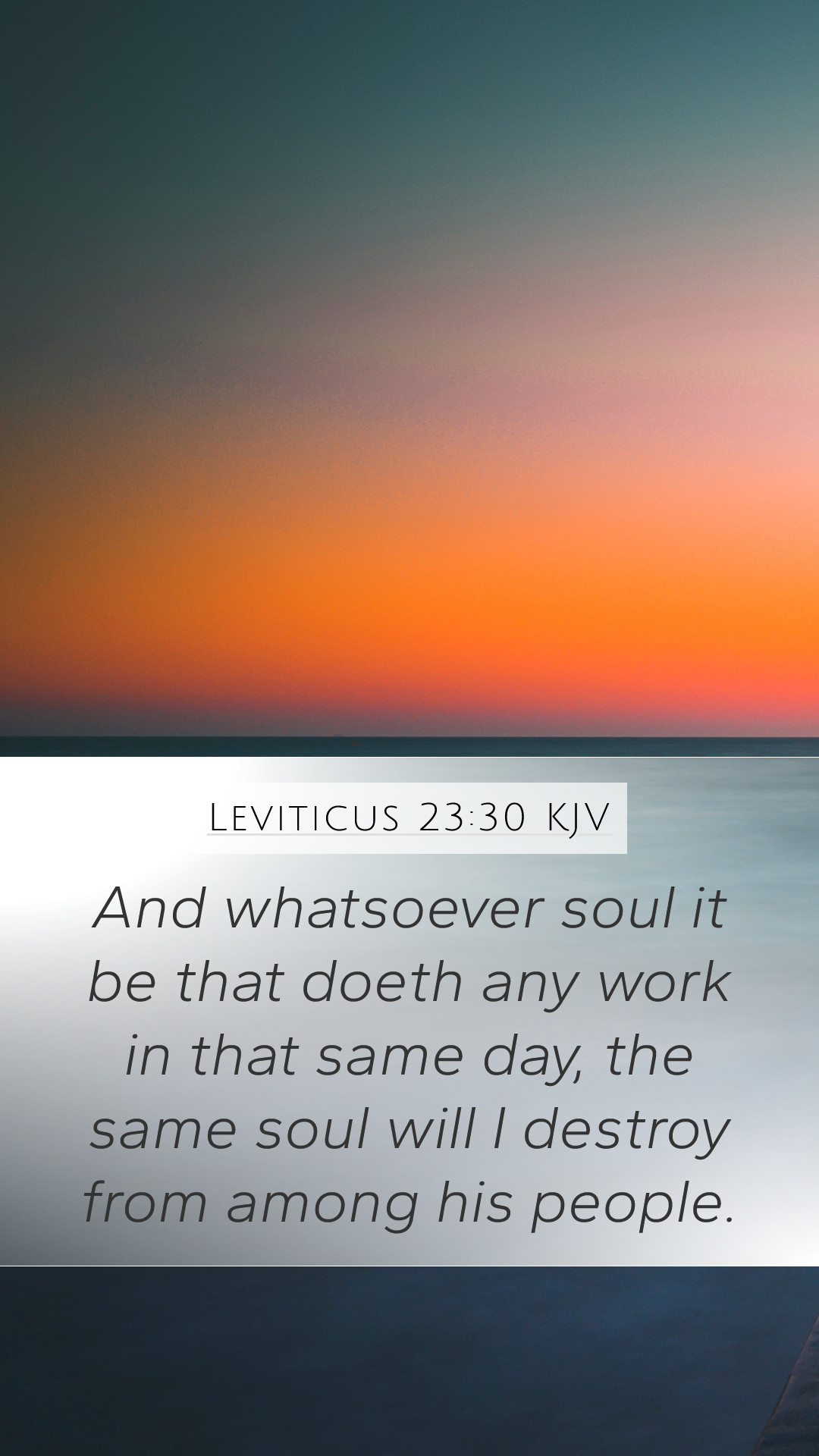Understanding Leviticus 23:30
Leviticus 23:30 is a significant verse within the Bible that provides insights into the ceremonial laws and the importance of observing the Day of Atonement in the Israelite tradition. This verse states:
“And whatsoever soul it be that doeth any work in that same day, the same soul will I destroy from among his people.”
Bible Verse Meaning
This verse underlines the seriousness of disobeying the command to rest and reflect on the Day of Atonement. The Day of Atonement (Yom Kippur) was a day set apart for fasting, penance, and worship, emphasizing the atonement for the sins of the people. Observing this day was crucial in maintaining a right relationship with God and addressing the sins of the community.
Commentary Insights
Matthew Henry's Commentary
Matthew Henry emphasizes that the strictness surrounding the observance of this day illustrates the seriousness with which God regards sin and the necessity of atonement. He notes that the Day of Atonement was a time for the people to humble themselves before God, reflecting on their sins and receiving forgiveness. Henry explains that doing any work on this sacred day was seen as an affront to God's commands and was met with severe consequences.
Albert Barnes' Commentary
Albert Barnes points out that the phrase “whatsoever soul it be” indicates that this command applied universally to all individuals within the community. Barnes elaborates that the 'destruction' mentioned signifies God's judgment on those who fail to observe His commands, highlighting the grave spiritual implications of neglecting the prescribed rituals of atonement.
Adam Clarke's Commentary
Adam Clarke provides a historical and cultural context to the verse, noting that this day's observance included significant rituals performed by the high priest in the tabernacle. Clarke posits that the severe warning against working signifies the sacredness of the day and the expectation of reverence by all Israelites. He further explains that this was a critical time for the people to seek reconciliation with God through the prescribed means of sacrifice and prayer.
Key Themes
- Consecration: The Day of Atonement was meant to be holy and set apart for God.
- Sin and Atonement: The emphasis on atonement underscores the gravity of sin and the need for confession and repentance.
- Divine Judgment: Failure to adhere to God's commands could result in spiritual and physical consequences.
Application of Leviticus 23:30
Understanding the significance of Leviticus 23:30 can offer valuable lessons for contemporary believers. The importance of observing spiritual practices and setting aside time for reflection and repentance is still relevant today. It encourages individuals and communities to prioritize their relationship with God and recognize the need for atonement, both personally and corporately.
Related Bible Cross References
- Exodus 31:14: Emphasizes the severity of breaking the Sabbath and its spiritual ramifications.
- Leviticus 16:29-31: Describes the observance of the Day of Atonement and its solemn purpose.
- Leviticus 23:27: Relates the specifics of the Day of Atonement and the significance of fasting on that day.
Conclusion
Leviticus 23:30 serves as a vital point of reflection for believers seeking to understand God's expectations for holiness and reverence. The verse illustrates how the Old Testament laws emphasize the need for atonement and a deep relationship with God, providing an essential context for interpreting Scripture and applying its teachings today.
Further Study and Resources
For those interested in conducting detailed studies on this verse and others, consider utilizing Bible study guides or joining Bible study groups that focus on the historical context and interpretations of Scripture. Online resources and courses can further enhance your understanding of the meaning of Bible verses and their application in daily life.


